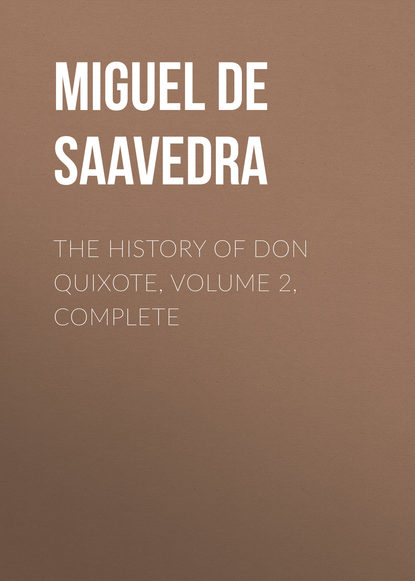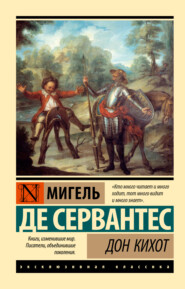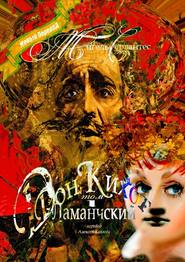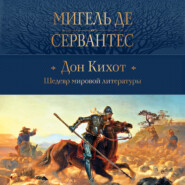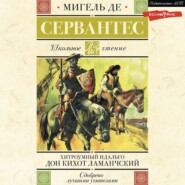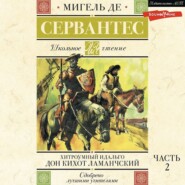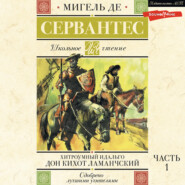По всем вопросам обращайтесь на: info@litportal.ru
(©) 2003-2025.
✖
The History of Don Quixote, Volume 2, Complete
Настройки чтения
Размер шрифта
Высота строк
Поля
“Then let your worship lead the way,” said Sancho, “perhaps it may be so; though I see it with my eyes and touch it with my hands, I’ll believe it as much as I believe it is daylight now.”
Don Quixote took the lead, and having gone a matter of two hundred paces he came upon the mass that produced the shade, and found it was a great tower, and then he perceived that the building in question was no palace, but the chief church of the town, and said he, “It’s the church we have lit upon, Sancho.”
“So I see,” said Sancho, “and God grant we may not light upon our graves; it is no good sign to find oneself wandering in a graveyard at this time of night; and that, after my telling your worship, if I don’t mistake, that the house of this lady will be in an alley without an outlet.”
“The curse of God on thee for a blockhead!” said Don Quixote; “where hast thou ever heard of castles and royal palaces being built in alleys without an outlet?”
“Senor,” replied Sancho, “every country has a way of its own; perhaps here in El Toboso it is the way to build palaces and grand buildings in alleys; so I entreat your worship to let me search about among these streets or alleys before me, and perhaps, in some corner or other, I may stumble on this palace – and I wish I saw the dogs eating it for leading us such a dance.”
“Speak respectfully of what belongs to my lady, Sancho,” said Don Quixote; “let us keep the feast in peace, and not throw the rope after the bucket.”
“I’ll hold my tongue,” said Sancho, “but how am I to take it patiently when your worship wants me, with only once seeing the house of our mistress, to know always, and find it in the middle of the night, when your worship can’t find it, who must have seen it thousands of times?”
“Thou wilt drive me to desperation, Sancho,” said Don Quixote. “Look here, heretic, have I not told thee a thousand times that I have never once in my life seen the peerless Dulcinea or crossed the threshold of her palace, and that I am enamoured solely by hearsay and by the great reputation she bears for beauty and discretion?”
“I hear it now,” returned Sancho; “and I may tell you that if you have not seen her, no more have I.”
“That cannot be,” said Don Quixote, “for, at any rate, thou saidst, on bringing back the answer to the letter I sent by thee, that thou sawest her sifting wheat.”
“Don’t mind that, senor,” said Sancho; “I must tell you that my seeing her and the answer I brought you back were by hearsay too, for I can no more tell who the lady Dulcinea is than I can hit the sky.”
“Sancho, Sancho,” said Don Quixote, “there are times for jests and times when jests are out of place; if I tell thee that I have neither seen nor spoken to the lady of my heart, it is no reason why thou shouldst say thou hast not spoken to her or seen her, when the contrary is the case, as thou well knowest.”
While the two were engaged in this conversation, they perceived some one with a pair of mules approaching the spot where they stood, and from the noise the plough made, as it dragged along the ground, they guessed him to be some labourer who had got up before daybreak to go to his work, and so it proved to be. He came along singing the ballad that says-
Ill did ye fare, ye men of France, In Roncesvalles chase-
“May I die, Sancho,” said Don Quixote, when he heard him, “if any good will come to us tonight! Dost thou not hear what that clown is singing?”
“I do,” said Sancho, “but what has Roncesvalles chase to do with what we have in hand? He might just as well be singing the ballad of Calainos, for any good or ill that can come to us in our business.”
By this time the labourer had come up, and Don Quixote asked him, “Can you tell me, worthy friend, and God speed you, whereabouts here is the palace of the peerless princess Dona Dulcinea del Toboso?”
“Senor,” replied the lad, “I am a stranger, and I have been only a few days in the town, doing farm work for a rich farmer. In that house opposite there live the curate of the village and the sacristan, and both or either of them will be able to give your worship some account of this lady princess, for they have a list of all the people of El Toboso; though it is my belief there is not a princess living in the whole of it; many ladies there are, of quality, and in her own house each of them may be a princess.”
“Well, then, she I am inquiring for will be one of these, my friend,” said Don Quixote.
“May be so,” replied the lad; “God be with you, for here comes the daylight;” and without waiting for any more of his questions, he whipped on his mules.
Sancho, seeing his master downcast and somewhat dissatisfied, said to him, “Senor, daylight will be here before long, and it will not do for us to let the sun find us in the street; it will be better for us to quit the city, and for your worship to hide in some forest in the neighbourhood, and I will come back in the daytime, and I won’t leave a nook or corner of the whole village that I won’t search for the house, castle, or palace, of my lady, and it will be hard luck for me if I don’t find it; and as soon as I have found it I will speak to her grace, and tell her where and how your worship is waiting for her to arrange some plan for you to see her without any damage to her honour and reputation.”
“Sancho,” said Don Quixote, “thou hast delivered a thousand sentences condensed in the compass of a few words; I thank thee for the advice thou hast given me, and take it most gladly. Come, my son, let us go look for some place where I may hide, while thou dost return, as thou sayest, to seek, and speak with my lady, from whose discretion and courtesy I look for favours more than miraculous.”
Sancho was in a fever to get his master out of the town, lest he should discover the falsehood of the reply he had brought to him in the Sierra Morena on behalf of Dulcinea; so he hastened their departure, which they took at once, and two miles out of the village they found a forest or thicket wherein Don Quixote ensconced himself, while Sancho returned to the city to speak to Dulcinea, in which embassy things befell him which demand fresh attention and a new chapter.
CHAPTER X.
WHEREIN IS RELATED THE CRAFTY DEVICE SANCHO ADOPTED TO ENCHANT THE LADY DULCINEA, AND OTHER INCIDENTS AS LUDICROUS AS THEY ARE TRUE
When the author of this great history comes to relate what is set down in this chapter he says he would have preferred to pass it over in silence, fearing it would not be believed, because here Don Quixote’s madness reaches the confines of the greatest that can be conceived, and even goes a couple of bowshots beyond the greatest. But after all, though still under the same fear and apprehension, he has recorded it without adding to the story or leaving out a particle of the truth, and entirely disregarding the charges of falsehood that might be brought against him; and he was right, for the truth may run fine but will not break, and always rises above falsehood as oil above water; and so, going on with his story, he says that as soon as Don Quixote had ensconced himself in the forest, oak grove, or wood near El Toboso, he bade Sancho return to the city, and not come into his presence again without having first spoken on his behalf to his lady, and begged of her that it might be her good pleasure to permit herself to be seen by her enslaved knight, and deign to bestow her blessing upon him, so that he might thereby hope for a happy issue in all his encounters and difficult enterprises. Sancho undertook to execute the task according to the instructions, and to bring back an answer as good as the one he brought back before.
“Go, my son,” said Don Quixote, “and be not dazed when thou findest thyself exposed to the light of that sun of beauty thou art going to seek. Happy thou, above all the squires in the world! Bear in mind, and let it not escape thy memory, how she receives thee; if she changes colour while thou art giving her my message; if she is agitated and disturbed at hearing my name; if she cannot rest upon her cushion, shouldst thou haply find her seated in the sumptuous state chamber proper to her rank; and should she be standing, observe if she poises herself now on one foot, now on the other; if she repeats two or three times the reply she gives thee; if she passes from gentleness to austerity, from asperity to tenderness; if she raises her hand to smooth her hair though it be not disarranged. In short, my son, observe all her actions and motions, for if thou wilt report them to me as they were, I will gather what she hides in the recesses of her heart as regards my love; for I would have thee know, Sancho, if thou knowest it not, that with lovers the outward actions and motions they give way to when their loves are in question are the faithful messengers that carry the news of what is going on in the depths of their hearts. Go, my friend, may better fortune than mine attend thee, and bring thee a happier issue than that which I await in dread in this dreary solitude.”
“I will go and return quickly,” said Sancho; “cheer up that little heart of yours, master mine, for at the present moment you seem to have got one no bigger than a hazel nut; remember what they say, that a stout heart breaks bad luck, and that where there are no fletches there are no pegs; and moreover they say, the hare jumps up where it’s not looked for. I say this because, if we could not find my lady’s palaces or castles to-night, now that it is daylight I count upon finding them when I least expect it, and once found, leave it to me to manage her.”
“Verily, Sancho,” said Don Quixote, “thou dost always bring in thy proverbs happily, whatever we deal with; may God give me better luck in what I am anxious about.”
With this, Sancho wheeled about and gave Dapple the stick, and Don Quixote remained behind, seated on his horse, resting in his stirrups and leaning on the end of his lance, filled with sad and troubled forebodings; and there we will leave him, and accompany Sancho, who went off no less serious and troubled than he left his master; so much so, that as soon as he had got out of the thicket, and looking round saw that Don Quixote was not within sight, he dismounted from his ass, and seating himself at the foot of a tree began to commune with himself, saying, “Now, brother Sancho, let us know where your worship is going. Are you going to look for some ass that has been lost? Not at all. Then what are you going to look for? I am going to look for a princess, that’s all; and in her for the sun of beauty and the whole heaven at once. And where do you expect to find all this, Sancho? Where? Why, in the great city of El Toboso. Well, and for whom are you going to look for her? For the famous knight Don Quixote of La Mancha, who rights wrongs, gives food to those who thirst and drink to the hungry. That’s all very well, but do you know her house, Sancho? My master says it will be some royal palace or grand castle. And have you ever seen her by any chance? Neither I nor my master ever saw her. And does it strike you that it would be just and right if the El Toboso people, finding out that you were here with the intention of going to tamper with their princesses and trouble their ladies, were to come and cudgel your ribs, and not leave a whole bone in you? They would, indeed, have very good reason, if they did not see that I am under orders, and that ‘you are a messenger, my friend, no blame belongs to you.’ Don’t you trust to that, Sancho, for the Manchegan folk are as hot-tempered as they are honest, and won’t put up with liberties from anybody. By the Lord, if they get scent of you, it will be worse for you, I promise you. Be off, you scoundrel! Let the bolt fall. Why should I go looking for three feet on a cat, to please another man; and what is more, when looking for Dulcinea will be looking for Marica in Ravena, or the bachelor in Salamanca? The devil, the devil and nobody else, has mixed me up in this business!”
Such was the soliloquy Sancho held with himself, and all the conclusion he could come to was to say to himself again, “Well, there’s remedy for everything except death, under whose yoke we have all to pass, whether we like it or not, when life’s finished. I have seen by a thousand signs that this master of mine is a madman fit to be tied, and for that matter, I too, am not behind him; for I’m a greater fool than he is when I follow him and serve him, if there’s any truth in the proverb that says, ‘Tell me what company thou keepest, and I’ll tell thee what thou art,’ or in that other, ‘Not with whom thou art bred, but with whom thou art fed.’ Well then, if he be mad, as he is, and with a madness that mostly takes one thing for another, and white for black, and black for white, as was seen when he said the windmills were giants, and the monks’ mules dromedaries, flocks of sheep armies of enemies, and much more to the same tune, it will not be very hard to make him believe that some country girl, the first I come across here, is the lady Dulcinea; and if he does not believe it, I’ll swear it; and if he should swear, I’ll swear again; and if he persists I’ll persist still more, so as, come what may, to have my quoit always over the peg. Maybe, by holding out in this way, I may put a stop to his sending me on messages of this kind another time; or maybe he will think, as I suspect he will, that one of those wicked enchanters, who he says have a spite against him, has changed her form for the sake of doing him an ill turn and injuring him.”
With this reflection Sancho made his mind easy, counting the business as good as settled, and stayed there till the afternoon so as to make Don Quixote think he had time enough to go to El Toboso and return; and things turned out so luckily for him that as he got up to mount Dapple, he spied, coming from El Toboso towards the spot where he stood, three peasant girls on three colts, or fillies – for the author does not make the point clear, though it is more likely they were she-asses, the usual mount with village girls; but as it is of no great consequence, we need not stop to prove it.
To be brief, the instant Sancho saw the peasant girls, he returned full speed to seek his master, and found him sighing and uttering a thousand passionate lamentations. When Don Quixote saw him he exclaimed, “What news, Sancho, my friend? Am I to mark this day with a white stone or a black?”
“Your worship,” replied Sancho, “had better mark it with ruddle, like the inscriptions on the walls of class rooms, that those who see it may see it plain.”
“Then thou bringest good news,” said Don Quixote.
“So good,” replied Sancho, “that your worship has only to spur Rocinante and get out into the open field to see the lady Dulcinea del Toboso, who, with two others, damsels of hers, is coming to see your worship.”
“Holy God! what art thou saying, Sancho, my friend?” exclaimed Don Quixote. “Take care thou art not deceiving me, or seeking by false joy to cheer my real sadness.”
“What could I get by deceiving your worship,” returned Sancho, “especially when it will so soon be shown whether I tell the truth or not? Come, senor, push on, and you will see the princess our mistress coming, robed and adorned – in fact, like what she is. Her damsels and she are all one glow of gold, all bunches of pearls, all diamonds, all rubies, all cloth of brocade of more than ten borders; with their hair loose on their shoulders like so many sunbeams playing with the wind; and moreover, they come mounted on three piebald cackneys, the finest sight ever you saw.”
“Hackneys, you mean, Sancho,” said Don Quixote.
“There is not much difference between cackneys and hackneys,” said Sancho; “but no matter what they come on, there they are, the finest ladies one could wish for, especially my lady the princess Dulcinea, who staggers one’s senses.”
“Let us go, Sancho, my son,” said Don Quixote, “and in guerdon of this news, as unexpected as it is good, I bestow upon thee the best spoil I shall win in the first adventure I may have; or if that does not satisfy thee, I promise thee the foals I shall have this year from my three mares that thou knowest are in foal on our village common.”
“I’ll take the foals,” said Sancho; “for it is not quite certain that the spoils of the first adventure will be good ones.”
By this time they had cleared the wood, and saw the three village lasses close at hand. Don Quixote looked all along the road to El Toboso, and as he could see nobody except the three peasant girls, he was completely puzzled, and asked Sancho if it was outside the city he had left them.
“How outside the city?” returned Sancho. “Are your worship’s eyes in the back of your head, that you can’t see that they are these who are coming here, shining like the very sun at noonday?”
“I see nothing, Sancho,” said Don Quixote, “but three country girls on three jackasses.”
“Now, may God deliver me from the devil!” said Sancho, “and can it be that your worship takes three hackneys – or whatever they’re called – as white as the driven snow, for jackasses? By the Lord, I could tear my beard if that was the case!”
“Well, I can only say, Sancho, my friend,” said Don Quixote, “that it is as plain they are jackasses – or jennyasses – as that I am Don Quixote, and thou Sancho Panza: at any rate, they seem to me to be so.”
“Hush, senor,” said Sancho, “don’t talk that way, but open your eyes, and come and pay your respects to the lady of your thoughts, who is close upon us now;” and with these words he advanced to receive the three village lasses, and dismounting from Dapple, caught hold of one of the asses of the three country girls by the halter, and dropping on both knees on the ground, he said, “Queen and princess and duchess of beauty, may it please your haughtiness and greatness to receive into your favour and good-will your captive knight who stands there turned into marble stone, and quite stupefied and benumbed at finding himself in your magnificent presence. I am Sancho Panza, his squire, and he the vagabond knight Don Quixote of La Mancha, otherwise called ‘The Knight of the Rueful Countenance.’”
Don Quixote had by this time placed himself on his knees beside Sancho, and, with eyes starting out of his head and a puzzled gaze, was regarding her whom Sancho called queen and lady; and as he could see nothing in her except a village lass, and not a very well-favoured one, for she was platter-faced and snub-nosed, he was perplexed and bewildered, and did not venture to open his lips. The country girls, at the same time, were astonished to see these two men, so different in appearance, on their knees, preventing their companion from going on. She, however, who had been stopped, breaking silence, said angrily and testily, “Get out of the way, bad luck to you, and let us pass, for we are in a hurry.”
To which Sancho returned, “Oh, princess and universal lady of El Toboso, is not your magnanimous heart softened by seeing the pillar and prop of knight-errantry on his knees before your sublimated presence?”





